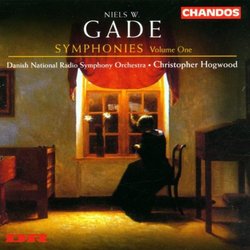| All Artists: Niels Gade, Christopher Hogwood, Danmarks Radiosymfoniorkester Title: Gade - Symphonies, Volume One / Danish National Radio SO � Hogwood Members Wishing: 1 Total Copies: 0 Label: Chandos Release Date: 1/23/2001 Genre: Classical Style: Symphonies Number of Discs: 1 SwapaCD Credits: 1 UPC: 095115986226 |
Search - Niels Gade, Christopher Hogwood, Danmarks Radiosymfoniorkester :: Gade - Symphonies, Volume One / Danish National Radio SO � Hogwood
 | Niels Gade, Christopher Hogwood, Danmarks Radiosymfoniorkester Gade - Symphonies, Volume One / Danish National Radio SO � Hogwood Genre: Classical
|
Larger Image |
CD Details |
CD ReviewsA little-known, but intriguing, 19th-century symphonist Russ | Richmond, VA | 12/09/2007 (5 out of 5 stars) "The music of the Danish composer, Niels Gade (1817-1890), is a little off the beaten track, but is well worth exploring by all those who enjoy the music of Schumann and Mendelssohn. Indeed, it is easy to mistake the music of Gade with that of those two composers. I am not going to indicate that Gade is an incredibly distinctive composer, but his finely constructed compositions are chocked full of attractive melodies. Additionally, many of his works contain a slight Nordic tinge, which I find to be engaging. The second symphony (1844) opens with a series of hunting calls in the horns, which gradually give way to an aggressive, yet infectious, dotted-eighth, skipping melody. The second movement begins as a faint, solemn processional. However, this theme builds in terms of texture and dynamics, until it unfolds into a melody of nobility and grandeur. The scherzo is delightfully brief and breezy. The regal finale is satisfyingly festive and conclusive. The eighth symphony (1871) was to be Gade's last. Again, this symphony's energetic string writing, subtle woodwind colorings and simple, yet important, brass proclamations are reminiscent of Mendelssohn. I will not get into a lot of detail here. But I will indicate there is a lot to like within this symphony, especially the celebratory finale. The most exciting piece on this program is the 'Scottish Overture'. This composition is filled with lively rhythms, rustic woodwind motifs, and large intervallic leaps, which imbue the work with an 'of the highlands' quality. It is an early work, but I find many of Gade's early works to be more energetic and colorful than those of his later period. The exuberant, almost Dvorákesque, coda would definitely bring the crowd to their feet if played at a live performance. I have thoroughly enjoyed all four volumes of Chandos' Gade series. The playing by the Danish National Symphony is quite committed throughout, and the sound engineering is excellent. I would encourage all admirers of Mendelssohn, Schumann or Schubert to give Gade a shot - you will not regret it. If you are curious to sample Gade's music, this volume or the one that features the exciting first symphony, would make an excellent introduction. Highly recommended! TT: 69:49" A Great Symphonist Terry J. Lehane | 09/09/2008 (5 out of 5 stars) "Gade's First Symphony knocked me out the first time I heard it 40 years ago. I have been promoting Gade ever since. He has always been known in Europe. But not in America. Gade was Denmark's greatest symphonic composer. Nielsen studied under him. If you are not acquainted with Gade you would do well to become familiar with any of his 8 symphonies. They range from the jouncy and Nordic joyous First to the pensive melancholic Eighth Symphony with its far away horn obligato in the first movement." Very attractive music in generally convincing performances G.D. | Norway | 01/06/2010 (4 out of 5 stars) "This is the first, auspicious release in Chandos's series of the Gade symphonies with the Danish National Radio Symphony Orchestra under Christopher Hogwood. Throughout his compositional career Gade stuck to the rather Mendelssohnian style he developed in his early works, but he retained an individual touch and an impressive ability to come up with clear and memorable tunes. Interestingly the earlier symphonies are generally more rewarding than the later works (and the first is probably the best), displaying a freshness and level of invention he never quite managed to get back to.
The second symphony is also a major work, worthy of a secure place in the repertoire - strongest, however, in the buoyant, ebullient first movement and the elfin, elegant, suave and brilliant finale. The performances are spirited and energetic as well, though I cannot overcome the feeling that a touch more of romantic atmosphere would not have gone amiss. The eighth symphony is brilliantly played as well, but is something of a curate's egg of a work, strangely subdued and introvert, well worth hearing but a little lacking both in drama and invention - although the Andantino movement is very impressive. The symphonies are coupled with an excellent version of the superb In the Highlands overture, a picturesque work of splendid themes and tautly effective construction. I have no complaints about the sound quality and won't hesitate to give this release a firm recommendation, even though it won't change anyone's life." |

 Track Listings (10) - Disc #1
Track Listings (10) - Disc #1